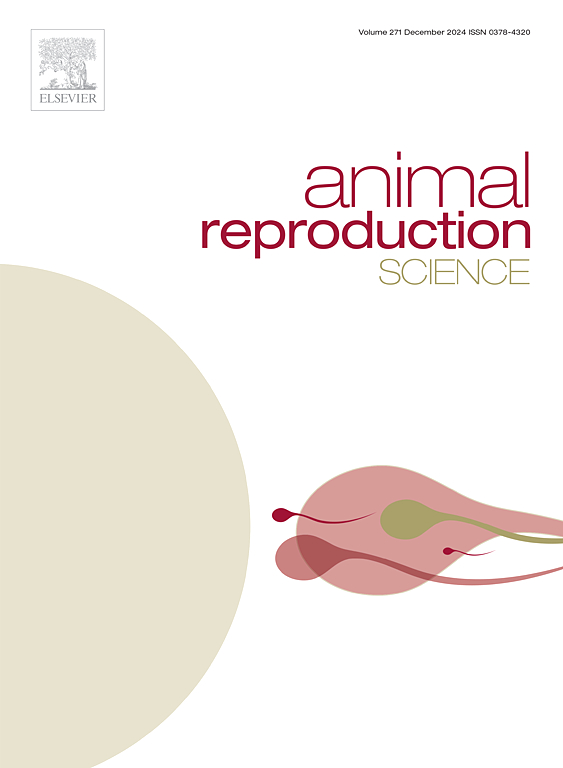补充亚精胺可保护猪卵母细胞在体外成熟过程中免受三氯生诱导的缺陷
IF 3.3
2区 农林科学
Q1 AGRICULTURE, DAIRY & ANIMAL SCIENCE
引用次数: 0
摘要
卵母细胞对环境污染物非常敏感,众所周知,三氯生(TCS)是一种普遍存在的抗菌剂,会生物积累并损害生殖功能。然而,tcs诱导卵母细胞变性的机制和有效的保护策略尚不清楚。本研究探讨了亚精胺(SPD)对tcs诱导的猪卵母细胞减数分裂破坏和受精缺陷的保护作用,重点探讨了其抗氧化和抗凋亡机制。我们发现TCS暴露通过诱导纺锤体缺陷、染色体错位、线粒体功能障碍、氧化应激、DNA损伤和细胞凋亡来破坏减数分裂进程,最终损害成熟和受精。补充SPD可通过稳定细胞骨架、减少氧化应激和抑制细胞凋亡,从而恢复卵母细胞的质量和发育能力,显著缓解这些影响。这些发现强调SPD是一种有希望的干预措施,可以抵消污染物引起的卵母细胞损伤,保护女性生育能力。本文章由计算机程序翻译,如有差异,请以英文原文为准。
Spermidine supplementation protects porcine oocytes against triclosan-induced defects during maturation in vitro
Oocytes are highly susceptible to environmental pollutants, with triclosan (TCS)-a pervasive antimicrobial-known to bioaccumulate and impair reproductive function. Yet, the mechanisms of TCS-induced oocyte degeneration and effective protective strategies remain unclear. This study explored the protective role of spermidine (SPD) against TCS-induced meiotic disruption and fertilization defects in porcine oocytes, focusing on its antioxidant and anti-apoptotic mechanisms. We found that TCS exposure disrupted meiotic progression by inducing spindle defects, chromosome misalignment, mitochondrial dysfunction, oxidative stress, DNA damage, and apoptosis, ultimately impairing maturation and fertilization. SPD supplementation significantly alleviated these effects by stabilizing the cytoskeleton, reducing oxidative stress, and suppressing apoptosis, thereby restoring oocyte quality and developmental competence. These findings highlight SPD as a promising intervention to counteract pollutant-induced oocyte damage and safeguard female fertility.
求助全文
通过发布文献求助,成功后即可免费获取论文全文。
去求助
来源期刊

Animal Reproduction Science
农林科学-奶制品与动物科学
CiteScore
4.50
自引率
9.10%
发文量
136
审稿时长
54 days
期刊介绍:
Animal Reproduction Science publishes results from studies relating to reproduction and fertility in animals. This includes both fundamental research and applied studies, including management practices that increase our understanding of the biology and manipulation of reproduction. Manuscripts should go into depth in the mechanisms involved in the research reported, rather than a give a mere description of findings. The focus is on animals that are useful to humans including food- and fibre-producing; companion/recreational; captive; and endangered species including zoo animals, but excluding laboratory animals unless the results of the study provide new information that impacts the basic understanding of the biology or manipulation of reproduction.
The journal''s scope includes the study of reproductive physiology and endocrinology, reproductive cycles, natural and artificial control of reproduction, preservation and use of gametes and embryos, pregnancy and parturition, infertility and sterility, diagnostic and therapeutic techniques.
The Editorial Board of Animal Reproduction Science has decided not to publish papers in which there is an exclusive examination of the in vitro development of oocytes and embryos; however, there will be consideration of papers that include in vitro studies where the source of the oocytes and/or development of the embryos beyond the blastocyst stage is part of the experimental design.
 求助内容:
求助内容: 应助结果提醒方式:
应助结果提醒方式:


